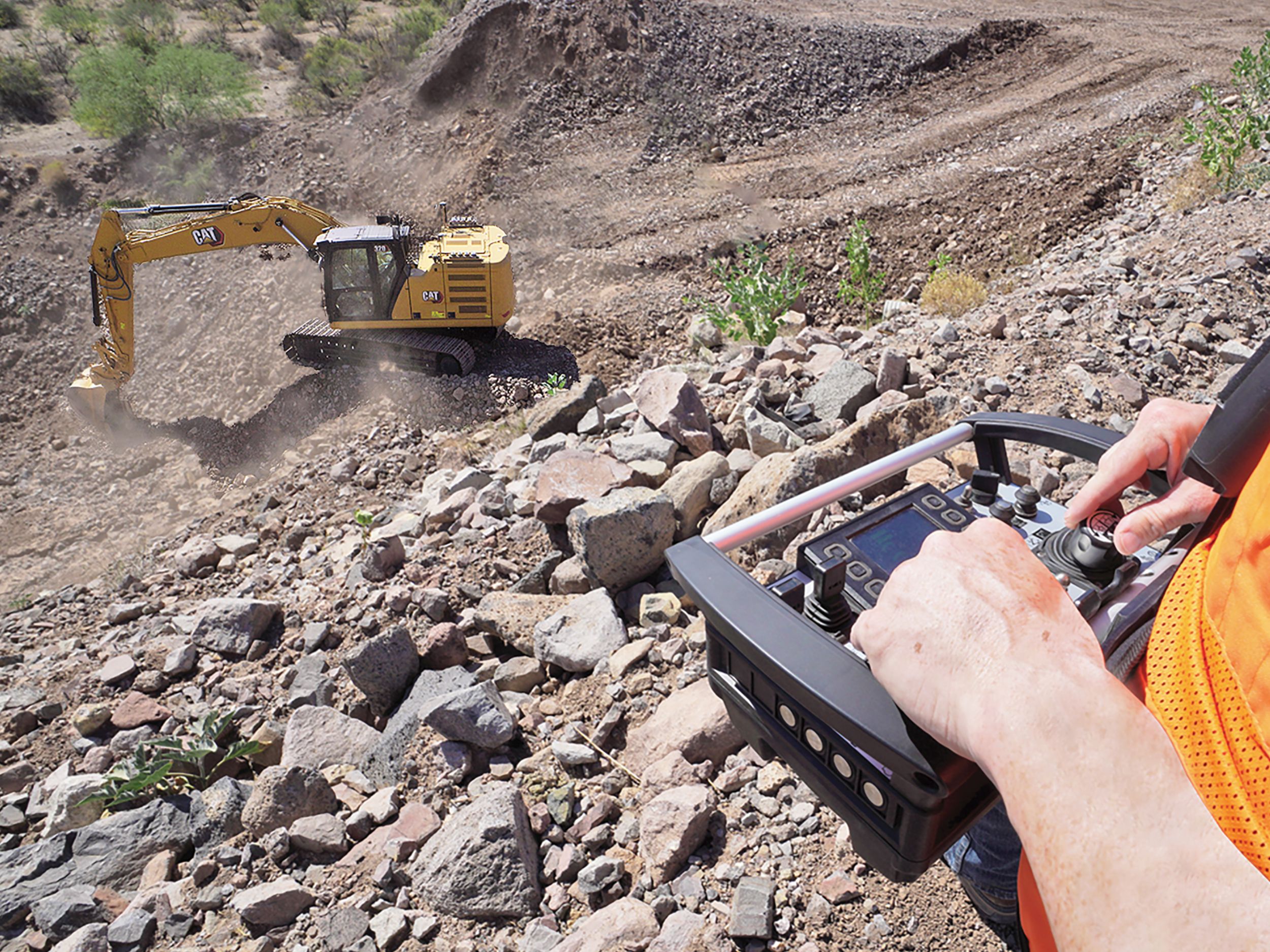Discover the Relevance of Excavator in Modern Building And Construction Projects
Excavators are crucial tools in modern building tasks. Their flexibility enables them to execute a large range of tasks, from excavating and grading to demolition and site preparation. Advanced features, such as hydraulic accessories and GPS, enhance their capacities and performance on task websites. As the market progresses, the value of excavators grows much more. Comprehending their duty can disclose insights right into the future of construction techniques. What exists ahead for these makers?
The Versatility of Excavators in Various Projects
Excavators are usually connected with large building projects, their flexibility permits them to be used in a vast array of applications, from residential landscape design to energy upkeep. In metropolitan setups, excavators can browse limited areas to dig foundations for homes or mount water drainage systems. Their ability to carry out delicate tasks makes them ideal for landscape design tasks, where they can excavate for fish ponds or plant trees. Additionally, excavators play an important role in utility upkeep, efficiently digging trenches for pipes or cords without interfering with surrounding locations. In agricultural applications, they assist in land clearing up and soil preparation. In addition, their flexibility enables them to be outfitted with various add-ons, improving their performance across various jobs. This diverse nature of excavators not just enhances different construction procedures but additionally shows their important role in modern-day framework development and maintenance.
Trick Functions and Sorts Of Excavators
The conversation on key functions and kinds of excavators highlights the important characteristics that make these equipments very useful in construction. Numerous excavator kinds, each created for specific tasks, show their versatility and efficiency across various applications. rc excavator. Recognizing these attributes and categories is crucial for enhancing their usage in modern-day construction projects
Excavator Enters Summary
Excavators play a critical duty in modern-day building and construction, providing versatility and effectiveness throughout different tasks. These hefty machinery systems come in a number of types, each customized for details applications. One of the most typical kinds include crawler excavators, recognized for their security on uneven terrain, and wheeled excavators, which give greater movement on paved surface areas. Miniature excavators are preferred for limited spaces and small-scale tasks, while long-reach excavators are developed for deep excavating. Additionally, there are specialized excavators, such as hydraulic excavators, which boost power and precision. Each kind includes unique capacities, making them essential for jobs varying from digging and grading to demolition and product handling. Comprehending these variations permits building and construction professionals to pick the ideal excavator for their task requires.
Trick Includes Explained
Comprehending the vital functions of excavators boosts their effective application in building projects. Excavators are identified by their powerful hydraulic systems, which offer the necessary force for excavating, training, and moving materials. Their articulated arms enable a large range of motion, assisting in accurate operations in restricted spaces. In addition, the variety of accessories, such as containers, grapples, and augers, broadens their versatility to meet different task requirements. The dimension and weight of excavators also add to their stability and ability to move on various terrains. Innovations in innovation have led to the integration of General practitioner and automation, boosting accuracy and effectiveness in excavation tasks. These functions collectively position excavators as essential devices in modern-day building and construction.
Applications in Construction
Transforming building and construction sites, excavators play a crucial function throughout various applications, varying from domestic building jobs to large framework developments. These versatile makers are furnished for tasks such as digging structures, trenching for utilities, and site grading. Different kinds of excavators, including crawler, rolled, and mini excavators, provide particular advantages tailored to the project demands. Spider excavators succeed in harsh terrains, while rolled excavators offer mobility on smooth surface areas. Small excavators are perfect for confined rooms, making them popular in metropolitan settings. The effectiveness and power of excavators significantly quicken building and construction processes, guaranteeing prompt task completion. Their flexibility even more enhances their significance, allowing construction groups to take on a varied selection of challenges successfully.
Enhancing Effectiveness and Performance on Work Sites
Optimizing effectiveness and productivity on task websites is a critical purpose in contemporary construction. Excavators play a critical duty in accomplishing this objective by improving different jobs. Their capability to perform multiple features-- such as grading, lifting, and digging-- reduces the requirement for extra equipment, therefore conserving time and resources.Moreover, excavators improve operations by allowing for faster completion of tasks. With sophisticated features like hydraulic accessories and GPS innovation, they can implement accurate procedures that reduce mistakes and revamp. This accuracy not only enhances the top quality of job but likewise optimizes material use, adding to set you back savings.The convenience of excavators allows them to adapt to different site problems, guaranteeing that jobs progress efficiently despite challenges. By incorporating excavators into construction procedures, teams can greatly increase their total productivity, resulting in timely job completion and increased productivity.
Safety Benefits of Utilizing Excavators
Excavators considerably boost security on building and construction sites through enhanced operator presence and lowered manual work dangers. By providing drivers with a clear sight of their environments, excavators help to stop accidents and injuries. In addition, the machinery reduces the demand for employees to involve in hazardous hand-operated tasks, even more advertising a more secure job atmosphere.
Boosted Driver Visibility
Although construction websites can be chaotic and loaded with possible threats, boosted operator visibility plays an essential duty in making certain safety and security when using excavators. Modern excavators are designed with huge, unobstructed windows and tactically positioned mirrors, enabling drivers to keep a clear view of their surroundings (rc excavator). This improved exposure is vital for identifying pedestrians, various other machinery, and different challenges, significantly lowering the threat of accidents. Additionally, numerous excavators include advanced technology, such as sensors and cams, to give operators with additional point of views, further boosting recognition. The capability to see even more plainly not just aids in effective operation however additionally fosters a safer workplace, making it much easier for drivers to browse intricate construction websites without endangering safety criteria
Lowered Manual Work Risks
When manual work is decreased with using excavators, numerous safety and security advantages emerge, significantly enhancing the wellness of construction employees. Excavators reduce the physical pressure connected with hefty lifting and repeated tasks, properly lowering the threat of bone and joint injuries. By automating processes such as excavating, grading, and moving products, they enable employees to maintain a safer distance from possible dangers. Furthermore, excavators are furnished with advanced safety and security attributes, such as rollover security systems and enhanced operator ergonomics, which additionally guard employees on site. The result is a considerable decrease in workplace mishaps and injuries, leading to raised efficiency and morale amongst building and construction groups. Ultimately, the adoption of excavators adds to a safer and a lot more effective building and construction setting.
Excavators in Earthmoving and Website Prep Work
In modern-day building, a substantial section of earthmoving and site prep work tasks counts on the performance and adaptability of excavators. These makers are developed to take care of various soil types and surface, making them important for rating, excavating, and trenching tasks. Their hydraulic arms can be furnished with different add-ons, such as containers and augers, permitting operators to tailor their approach based upon specific task requirements.Excavators succeed at relocating large volumes of planet quickly and successfully, which speeds up the total construction timeline. They can browse tight spaces and challenging sites where traditional devices may have a hard time, boosting productivity. In addition, the precision of excavators warranties that site preparation sticks to stringent specs, reducing the risk of errors that might lead to costly rework.
The Role of Excavators in Demolition Tasks
Excavators play a vital function in demolition jobs, as they have the power and dexterity needed to dismantle frameworks successfully. Equipped with numerous attachments such as hydraulic breakers, shears, and grapples, these equipments can adjust to different demolition needs, whether for little buildings or large commercial websites. Their flexibility allows drivers to deal with complex tasks while preserving security and precision.In addition to their demolition capacities, excavators assist in particles removal, making certain that work websites remain risk-free and organized. By breaking down frameworks into workable items, they permit streamlined clearing up and recycling of materials, aligning with modern-day sustainability efforts.Moreover, excavators can access tight rooms and navigate unequal surface, making them indispensable in urban try here demolition jobs. In general, their durable design and multifunctionality make excavators an essential asset in the demolition stage of construction, adding significantly to job timelines and performance.


Future Trends in Excavator Modern Technology and Use
As the construction industry advances, innovations in excavator technology are poised to change their use and effectiveness markedly. One significant pattern is the integration of automation and expert system, enabling excavators to run with minimal human treatment. This change will boost precision in tasks such as grading and trenching, reducing human error and increasing productivity.Additionally, the surge of electric and hybrid excavators is shaping a much more lasting building and construction setting, lowering carbon exhausts and gas costs. Boosted telematics systems are also emerging, making it possible for real-time surveillance of maker performance and upkeep needs, which can result in better operational effectiveness and longer devices lifespan.Moreover, developments in accessory technology are increasing the adaptability of excavators, permitting them to carry out a wider array of tasks. The mix of these trends demonstrates view website a future where excavators are smarter, greener, and much more adaptable, ultimately reshaping building and construction job characteristics.
Regularly Asked Questions
Just How Do Excavators Compare to Various Other Building Machinery?
Excavators, identified by their convenience and power, stand out in excavating and earthmoving contrasted to other machinery. Their capacity to carry out different jobs, including lifting and demolition, makes them important in building and construction tasks, boosting overall efficiency.

What Is the Average Life-span of an Excavator?
The ordinary lifespan of an excavator usually varies from 7,000 to 10,000 operating hours, relying on upkeep, usage problems, and design. Proper care can expand this life expectancy, guaranteeing peak performance throughout its operational years.
How Are Excavators Kept for Optimum Efficiency?
Excavators call for routine maintenance for peak efficiency, including regular inspections, liquid checks, filter replacements, and timely repair work. Implementing a preventive maintenance timetable helps extend their life expectancy and assurances efficient procedure in various construction settings.
What Are the Costs Associated With Leasing vs. Acquiring an Excavator?
The expenses related to getting an excavator versus renting out vary considerably. Renting offers lower upfront expenditures however can accumulate with time, while purchasing calls for a considerable first investment, yet supplies long-lasting financial savings and possession possession advantages.
What Training Is Needed to Operate an Excavator?
Running an excavator needs specialized training, normally including security methods, device operation methods, and environmental understanding. Certification programs usually mandate practical experience, enabling operators to take care of different jobs efficiently while ensuring compliance with market guidelines. The most usual kinds site web consist of spider excavators, recognized for their security on irregular surface, and rolled excavators, which give higher movement on smooth surfaces. Small excavators are favored for limited spaces and small-scale tasks, while long-reach excavators are developed for deep digging. In addition, there are specialized excavators, such as hydraulic excavators, which improve power and precision. Different kinds of excavators, consisting of spider, rolled, and mini excavators, give certain advantages tailored to the project needs. Crawler excavators stand out in harsh surfaces, while rolled excavators offer flexibility on smooth surfaces.